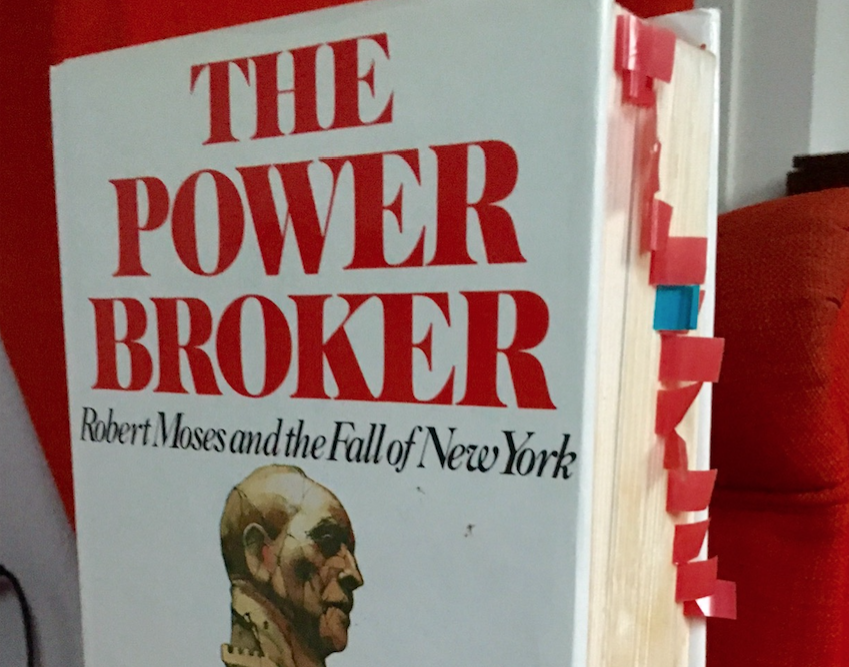When I was twenty years old, I showed up one day for work as an intern and my boss had a huge book waiting for me: The Power Broker by Robert Caro. “Read this,” he said, “it’s the most important book on power ever written.”
Anyone that’s read it, know that this is not just any book. For starters, it’s some 1336 pages. My (hardcover) copy weighed nearly five pounds. And the power broker at the center of it? He’s the parks commissioner of New York City. It’s one of those books that sits on your shelf and makes other people go: “Wait, did you actually read that?”
I actually did. It was a struggle that took nearly three weeks, but I made it.
It takes a somewhat deranged type of person to sit down and read a thousand pages of something just for the fun of it. But anyone that’s done it can tell you, it’s an experience like no other. For me, it was my first taste of a pleasure that would come to serve me very well in life: A love of really really long books.
Ron Chernow’s 800 page biography of Rockefeller. Grant and Sherman’s memoirs. Edison’s biography. Eleanor Roosevelt’s two-volume biography set. Gibbon’s Decline and Fall. Edmund Morris’s books on Theodore Roosevelt. Bugliosi’s book on the Kennedy assassination (which is so big the footnotes come on a disk). Thucydides’s History of the Peloponnesian War. Herodotus’ Histories. Collected volumes in the Library of America series.
These are the kind of books that show you who you are as a reader and as a person. If only because they are a kind of a “marshmallow test” for books. I could pick up any normal book right now and get something out of it. The process won’t be difficult—getting through a couple hundred breezy, friendly pages never is. It won’t test my limits. Or, I can pick something long. A book by Ron Chernow might spend a couple hundred pages just on someone’s childhood or the passing of a single bill or a minor battle. Can you push through that? Can you wait for the connection between some minor incident and its place in the person’s life or a nation’s history? Can you put together all these events to understand the larger picture? In other words, are you willing to trade one marshmallow now for a whole bag of them in the future?
On top of that, what’s required is dedication and above all, energy. Farnam Street had a post recently talking about how the way to get through big books is 25 pages a day. I don’t totally disagree with that, I’ve just found that style is nice in theory but less effective in practice. Really, it’s about whether you can go through large blocks of time at this thing, concerted but sustained blocks of effort—almost like a fartlek workout. Because broken up into too many pieces, you’ll miss the whole point of the book, like the proverbial blind man touching an elephant. Those who conquer long books know that it’s not a matter of reading some pages before you fall asleep but rather, canceling your plans for the night and staying in to read instead.
I’ve always seen reading as an active process, and these type of books are no exception. They’re to be read with a pen in hand, a phone ready to look stuff out. I can still tell you which passages struck me, in The Power Broker, which words I read for the first time and had to look up, and how the book made me feel. I know this because my copy is a riddled with notes and marginalia as it is with food detritus. Packed in these pages are quotes, anecdotes—that Robert Moses had an enormous wooden desk he liked to keep completely clean (with no drawers so he could never hide problems away). How he built the bridges too low to prevent buses from traveling under them (because he was racist and classist). How he designed all the city’s highways but didn’t know how to drive and never been forced to sit in traffic (and how this ignorance created fundamental flaws). All these are things to be written down, and to be remembered. Of course, there’s also the long, almost Greek moral decay in the central character—emphatic evidence of the way that power corrupts. I can even go back and read the blog posts—see myself learning these very lessons—that I wrote when I went back through the book for my notecard system.

Really immersing yourself into material is what makes the experience so enjoyable. There’s a line from John Adams: “Pen, ink and paper and a sitting posture are great helps to attention and thinking.” I’d add a couple more to that when it comes to reading: food and music. I can tell you what I was eating when I read The Power Broker—and not just because my copy is discolored by food and water stains. I can tell you what I was listening to when I read it (usually a crappy Chinese restaurant on Western and Venice or Campos Famous Burritos and Inside In/Inside Out by The Kooks, respectively).
The same goes for most of the long books I’ve thrown myself into. For Sherman’s memoirs, I listened to “I Dreamed a Dream” from Les Mis over and over on repeat (for some reason). Reading books in the Library of America series, as his memoir is, are always a joy because the books are designed to lay flat and stay open–making them perfect for almost any position. I remember reading one of Edmund Morris’s biography of Theodore Roosevelt at Carl’s Jr. I remember finishing another on a flight to a vacation. I eat a lot better now than I did when I was a kid, but these are memories that I can access very quickly—along with the material and its ethos.
I think the final part of reading those long books—what makes it a joy instead of a chore—is reminding yourself who is in charge. That is: you. I’ve read dozens of books that are thousand of pages, but I’ve quit just as many. I’m not a glutton for punishment, I won’t endure what isn’t good. Sadly, to paraphrase a book review from the great Ambrose Bierce, the front and back covers of way too many books are “just too far apart.” Don’t, as EM Forster, put it, be the kind of person who pretends to like a long book they foolishly read, just to “convince others and himself that he has not wasted his time.” One shouldn’t read something just because it is long. In fact, for bad writers, it’s probably easier to be long than it is to be tight and compact.
Save your time for the great stuff. And even then, savor them sparingly. I love steak, but I don’t sit down to a porterhouse every night. That would be absurd.
But I will tell you, last week, on vacation, in Hawaii, I was feeling a bit frustrated. I hadn’t read anything great in a while. A book I’d been excited about turned out to be a disappointment. I ended up driving to Barnes and Noble. I asked the clerk for the biography section. I went straight to the “C”s and found what I was looking for: The Passage of Power. Another 736 page book by Robert Caro.
It had been almost ten years since I was waist deep in a book of his and it felt so right. And the next night, I appropriately treated myself to a juicy steak. ![]()






